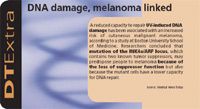- Acne
- Actinic Keratosis
- Aesthetics
- Alopecia
- Atopic Dermatitis
- Buy-and-Bill
- COVID-19
- Case-Based Roundtable
- Chronic Hand Eczema
- Chronic Spontaneous Urticaria
- Drug Watch
- Eczema
- General Dermatology
- Hidradenitis Suppurativa
- Melasma
- NP and PA
- Pediatric Dermatology
- Pigmentary Disorders
- Practice Management
- Precision Medicine and Biologics
- Prurigo Nodularis
- Psoriasis
- Psoriatic Arthritis
- Rare Disease
- Rosacea
- Skin Cancer
- Vitiligo
- Wound Care
Article
Immune cell replacement shown to shrink tumors
New Orleans — A new approach to immunotherapy can cause regressions in more than half of patients with metastatic melanoma refractory to all other treatments. The approach is known as cell transfer immunotherapy.

"We identify cells within the melanoma patient that are capable of reacting against their own cancer, grow them to large amounts ex vivo, then eliminate the patient's own immune system and replace it with these anti-tumor cells," says Steven A. Rosenberg, M.D., Ph.D., chief, surgery branch of the National Cancer Institute in Bethesda, Md., and lead researcher on the study. "That causes very large numbers of anti-tumor immune cells to grow inside that patient's body and can cause major cancer regression. It's a new kind of approach to cancer immunotherapy that is different from most conventional treatments."
In the first study of this treatment, researchers treated 13 patients with metastatic melanoma - who had not responded to standard treatments -with immune cells produced in the laboratory specifically to destroy their tumors. Six of the patients achieved at least 50 percent tumor shrinkage, with no growth or appearance of new tumors. In four additional patients, the treatment achieved significant shrinkage of one or more metastatic deposits (Dudley ME et al. Science. 2002 Oct 25;298(5594):850-854).
"Eighteen of those 35 patients have had objective cancer regressions (publication pending)," said Dr. Rosenberg at the 63rd Annual Meeting of the American Academy of Dermatology Annual Meeting here.
Unlike surgery, radiation or chemotherapy, the treatment attempts to take advantage of the body's own natural immune defenses. And unlike many previous studies involving adoptive cell transfer therapies, which resulted in only a fraction of a percent of the injected cells surviving, the new treatment uses non-myeloablative lymphodepletion to help ensure the cells' proliferation and persistence in vivo.
First, investigators harvested tumor-infiltrating lymphocytes (TILs) reactive to melanoma antigens from each patient. These cells were expanded to large numbers in the laboratory using IL-2. Researchers also gave patients cyclophosphamide and fludarabine for one week before performing adoptive cell transfer and instituting concomitant treatment with IL-2. On average, patients received 7.8 x 1010 cells and nine doses of IL- 2, beginning one day after chemotherapy ended.
Researchers noticed tumor regression in the lung, liver and lymph nodes, and at cutaneous and subcutaneous sites. Regression also occurred in intraperitoneal masses.
The transferred immune cells, which in some patients ultimately constituted a majority of their immune systems, persisted for more than four months. Eventually, patients' old immune systems recovered and restored their ability to battle infections.
Among patients in the study, only occasional opportunistic infections developed during treatment. Other side effects, which were mild and easily controlled, included vitiligo and uveitis.
Still experimental The treatment remains highly experimental, and its underlying mechanism is yet to be fully understood. However, Dr. Rosenberg and his colleagues hypothesize that perhaps the lymphodepletive regimen eliminated regulatory cells or altered homeostatic mechanisms that limit lymphocyte numbers. This could have allowed the transferred cells to grow quickly and survive once transplanted.
One day, the treatment may benefit patients other than those with melanoma. In particular, researchers theorize that they should be able to raise immune cells that will recognize and attack many types of tumors.
Disclosure: Dr. Rosenberg reports no financial interests regarding this article.
For more information: http://www.nih.gov/
Newsletter
Like what you’re reading? Subscribe to Dermatology Times for weekly updates on therapies, innovations, and real-world practice tips.











